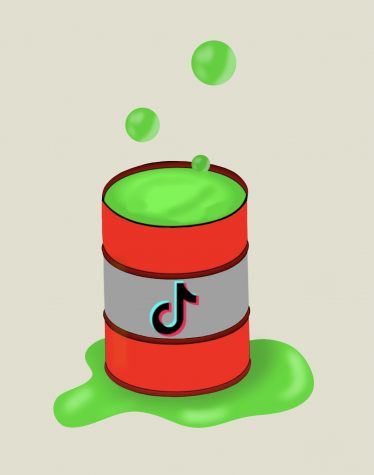Toxic TikTok Trends are Taking Over
March 4, 2021
Since people are growing used to the idea of spending more time at home, TikTok has proven to be an addictive way to eat up your time. You can scroll endlessly on your “for-you page,” which is perfectly catered to your interests using an algorithm based on your likes and search history.

With all the positive trends that TikTok has brought, there’s also a bad side. The popular app has brought forth numerous harmful trends, such as cancel culture, glorification of drugs and alcohol and the promotion of eating disorders. Young adults are finding new ways to spread toxicity through their 15-60 second videos around an app that could be a force of good.
Cancel culture has become a dangerous phenomena. Younger, more impressionable viewers will agree with whatever the majority is preaching, failing to do any sort of background research of their own. One video will say one thing, and an endless chain of “duets,” as they’re referred to, will pop up, attacking the original poster relentlessly, like an echo chamber. Even if the original creator does need to be held accountable for something, this mob mentality that has festered on the popular app will only extend to real-life scenarios — kids will grow into adults who lack individual thought and “go with the flow.”
Not only does cancel culture run rampant, but there are also so-called “educators” or “influencers” who share their opinions as if they’re fact. If you even slightly disagree in the comments, you’re hounded on by hundreds or even thousands of other users. TikTok should be a place where opinions can be shared freely without fear of harassment. However, this rhetoric does not extend to opinions that most can agree are harmful, such as racism, homophobia, misogyny, etc.
Other trends display drugs and alcohol as something that they’re not. They’re romanticized to the point where a younger demographic may engage in behaviors with long-term consequences. Several accounts, such as user @mooptopia, show off their use of drugs. While what they’re doing isn’t illegal, it can influence the younger generation into forming dangerous habits.
Drug use isn’t the only unsafe habit that is encouraged; so are eating disorders. Several TikTok users post videos with unrealistic eating and exercise habits that may drive viewers to develop low self-esteem and mimic the unsafe rituals. Other men and women, who may have larger body types, make videos and receive thousands of unsolicited comments about their “undesirable” appearance or unhealthy body habits — “fat-shaming,” as it’s often referred to as.
Is there really a way to rid of these trends? Despite any efforts to reply to toxic videos in an attempt to educate the public, worse trends will pop up elsewhere. All of these well-intentioned efforts prove to be futile. TikTok can be a force of good — you can see people make whipped coffee, feta cheese pasta, cute babies, animals and funny clips. While there will always be bad on this app, hopefully these light-hearted videos will overwhelm the darker content.


